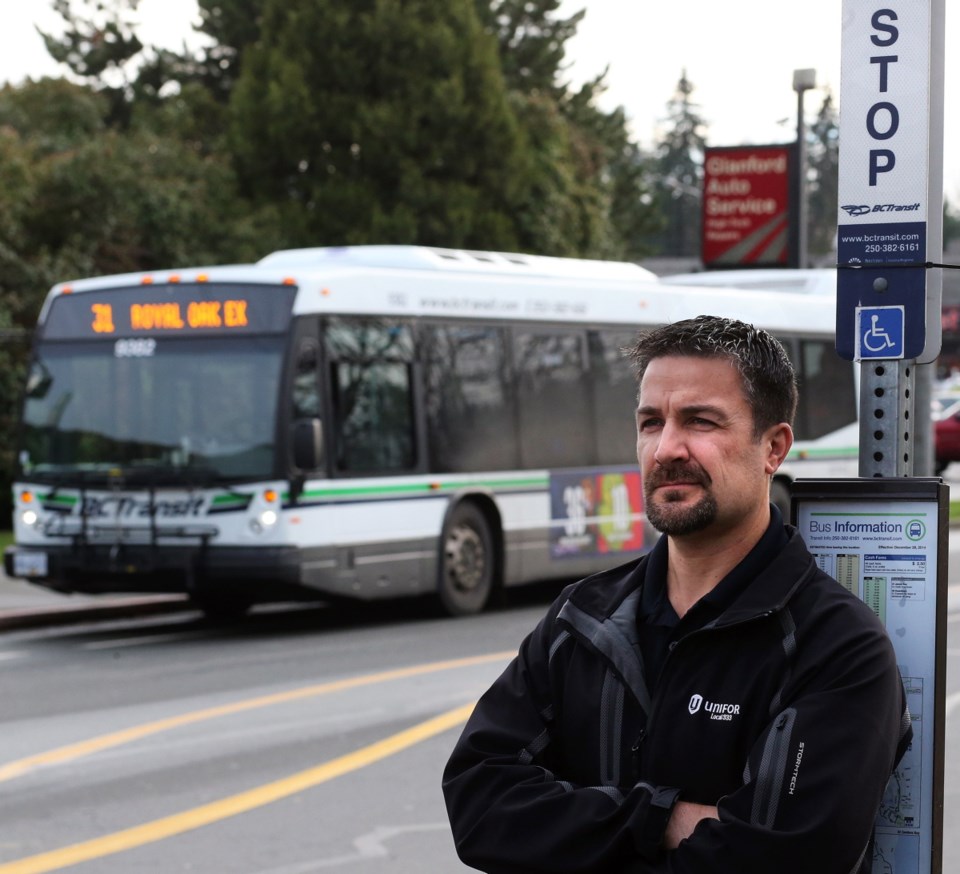At least a dozen bus drivers in Greater Victoria have been disciplined by B.C. Transit for refusing to obey a policy requiring them to call out all stops along their routes, says the president of the union representing 550 drivers.
Ben Williams, of Unifor 333, said one driver was suspended for a day without pay on Monday, a dozen others received warnings and an acting transit supervisor was demoted from her position after criticizing the call-out policy. The suspended driver was “actually calling out stops, he just wasn’t calling out every single stop,” Williams said.
The vast majority of drivers are “extremely upset” with the directive — made to accommodate blind passengers — that was first slated to go into effect April 22, 2014, he said.
The call-out policy was B.C. Transit’s answer to a complaint of discrimination made to the B.C. Human Rights Tribunal by the Victoria-based Canadian Federation of the Blind.
But the union says visually impaired passengers would be better served by an automated system common across North America, including Vancouver. Forcing drivers to call out hundreds of stops a day, especially at intersections, is dangerous for everyone on the bus, Williams said.
John Palmer, B.C. Transit’s director of safety and emergency management, said the implementation is “going well,” with continued training support to help drivers.
But Elizabeth Lalonde, past president of the Victoria-based Canadian Federation of the Blind, estimated that 80 per cent of bus drivers are not calling out stops, based on a membership survey during one week late in 2014.
Even when she boarded a bus with five other people using white canes, the driver did not call out the stops.
“It’s unbelievable,” Lalonde said. “It’s frankly exhausting after a while. It makes you feel like you’re doing something bad.”
Blind passengers now feel anxious boarding buses, wondering if they are getting one of the many drivers who oppose the policy. The minority of drivers who do call out stops are “wonderful,” but an automated system would be “the best thing for everyone,” she said.
That said, Lalonde thinks the union is being somewhat “disingenuous” given that operators sometimes carry on conversations while driving.
B.C. Transit estimates that an automated system could cost $1.2 million to $5 million. Unifor said B.C. Transit has millions of dollars in reserves that could be used.
The union is fighting the call-out directive on two fronts: It is seeking a second hearing at the B.C. Human Rights Tribunal, because the first hearing on equality of access did not involve the union. It has also filed a grievance with B.C. Transit, saying the call-outs are dangerous.
A 2014 report by Grand River Transit in Kitchener, Ont., in response to an Ontario human rights decision mandating driver call-outs, found that drivers spent 25 per cent less time looking in their mirrors due to repeated glances at announcement sheets bearing street names.
Driver levels of mental and time pressure, effort and frustration roughly doubled both for new and experienced drivers, the report showed.
Williams said that Victoria drivers regularly change routes and would be challenged to call out stops with unfamiliar street names as often as every 32 seconds on some routes.
Williams also criticized the suspension of Tana MacKay from a supervisory position, although she retains her position as a transit operator. MacKay, a workers’ advocate, was quoted in the Oct. 19 Times Colonist as saying the safety risk in making announcements was “outrageous.”
Williams said management is punishing MacKay for speaking out publicly.
“The fact that she spoke out and said she was not going to do this, they have taken away a position that she has held for 14, 15 years.”
That version of events was supported by veteran driver Joe Hronek, who has also spoken out publicly and filed a workplace safety complaint with WorkSafe B.C. over the call-out policy. MacKay has also filed a WorkSafe complaint.
“John Palmer of B.C. Transit pulled Tana off the car because of the statement she made in the article, saying he felt he had no confidence in her ability to fulfill the duties of a part-time transit supervisor because of the statement in the story,” Hronek said.
Palmer said B.C. Transit has an obligation to investigate any employee who refuses to follow a policy and the right to begin progressive discipline. Transit’s Employee Code of Conduct states that employees cannot respond to media questions unless authorized by the corporation.
“However, we are not able to comment on the specifics of any investigations or disciplinary actions as these are private personnel matters,” Palmer said.
B.C. Transit is looking for a technological fix for driver call-outs even as it plans to extend them to other areas of B.C. It’s planning to prepare a request for proposals this spring.
Williams said that Victoria is not unique in any way that would rule out the systems out there now. “B.C. Transit does not need to reinvent the wheel.”



